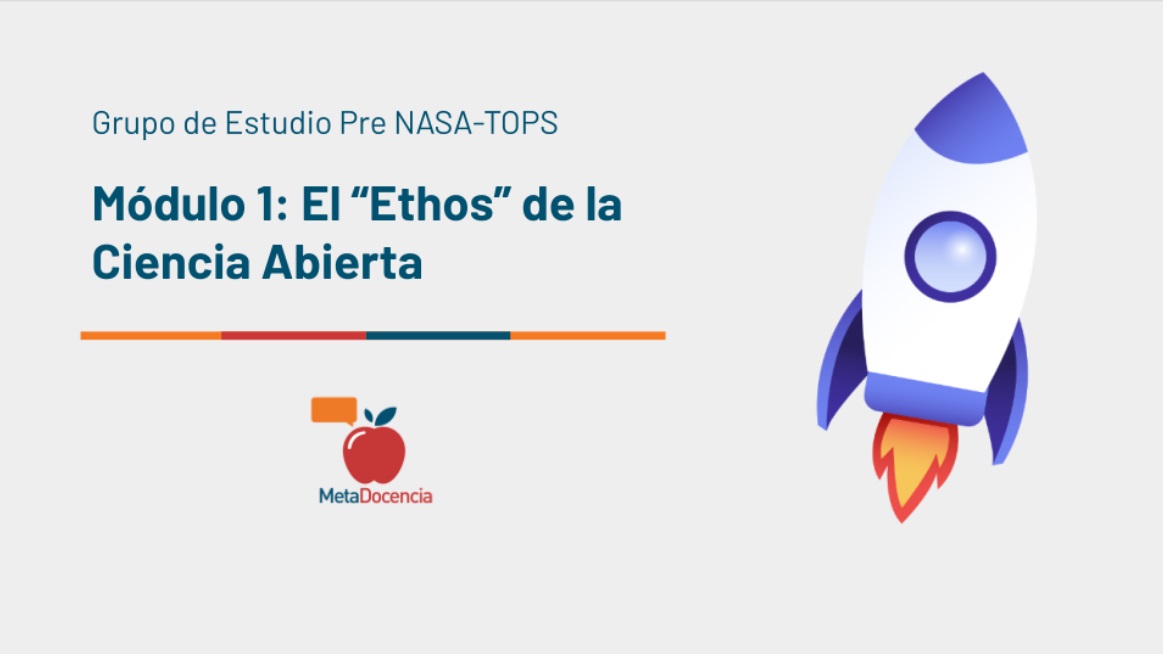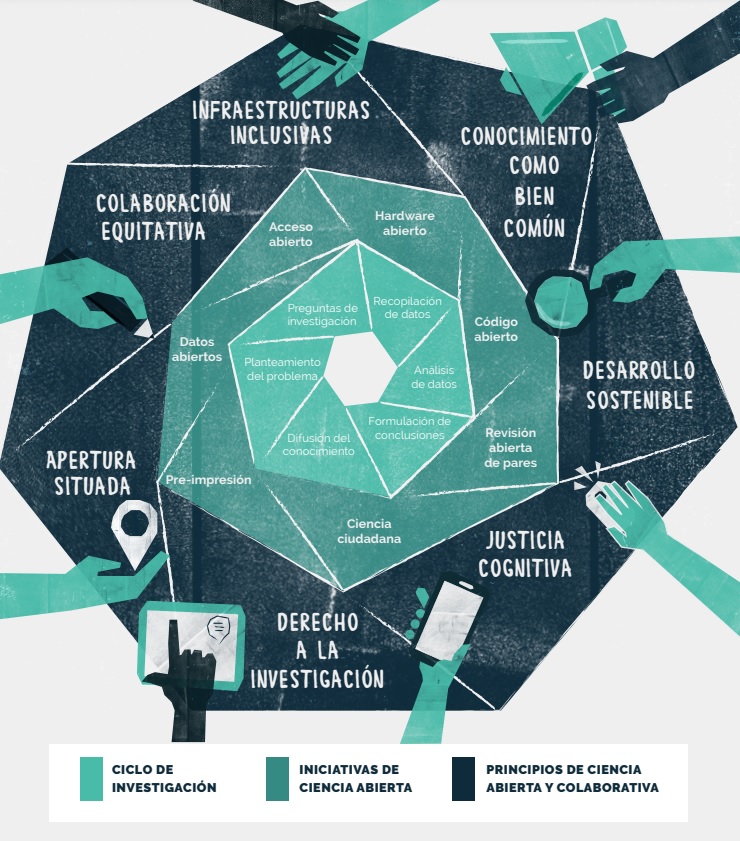Exploring NASA-TOPS in Community: The “Ethos” of Open Science
As we mentioned a few months ago, in 2024 MetaDocencia will begin teaching principles of Open Science in Spanish through virtual cohorts lasting several weeks. To prepare, we invite everyone in the MetaDocencia community to study the original English content of the Open Science 101 course together, part of the TOPS (Transform to Open Science) initiative organized by NASA. We have prepared a series of articles summarizing our group learning on these topics. In this first edition, we share some reflections that expand on what we have learned about the “Ethos” of Open Science.

Between January and March 2024, we organized a study group with five meetings corresponding to the five modules of Open Science 101 and a closing meeting. In each of these meetings, we reviewed various topics that comprise the world of Open Science: its core ideas, the most used tools, how to handle open data and code, and much more.
We always approach it with a local perspective, thinking about situations and examples from our own experiences in Latin America. Additionally, we carefully select supporting materials (texts, repositories, maps, videos, etc.) to enrich participation and make the regional perspective dialogue with the principles presented in the course. Happily, our community is very interested in the topic and continues to actively discuss it on our Slack (join our #ciencia-abierta Spanish speaking channel open to everyone! (English also welcome in the #english channel)), asking questions and sharing their badges upon completing each module. We are very pleased to have created such a rich exchange space and to be attracting people from different geographies and specialties – many of whom already have extensive experience in Open Science. Below, we share what we learned from the first meeting.
Open Science is a movement
Module 1 of Open Science 101 introduces us to its definition: “Open Science is the principle and practice of making research products and processes available to all, while respecting diverse cultures, maintaining security and privacy, and fostering collaborations, reproducibility, and equity” ( White House Office of Science and Technology Policy Memorandum, 2022).
Through the lesson, we learn the main motivations for practicing Open Science and review the benefits and challenges of adopting open practices. The module provides an overview of the options available when deciding whether scientific research products should be shared openly. Additionally, we learn about some groups that work openly and how to collaborate with people and groups in the Open Science community.
One topic that generated considerable debate was the definition and the “what to do” of Open Science. We understood that, in a way, it emphasizes Science for well-being, akin to its oldest foundations. We call it a movement because it seems to be expanding towards more open forms, in a transformative and adaptive process in which all of us who do Science are involved.
From reading the definitions presented by the module, our community would like to add the concept of co-production. This would be a way to avoid merely extractive Science, something that deeply affects us as Latin Americans. In recent years, we have seen the immense growth of data exploration, which concerns us as a society. More than just data providers, we want to create and benefit from the responsible Science we conduct, which is also very motivating.

Open Science is political
Another collective conclusion we reached is that Open Science is not a “type of Science”; it is a way of doing things—often challenging the status quo. Thus, like any form of Science, it is deeply political. Decisions and power dynamics influence which topics are researched, who funds or receives resources, who publishes, gets credit, or can access publications, to name just a few examples.
Our community provided diverse examples, leading to broad and current discussions. For instance, we discussed Open Science in the context of the predatory use of data, genetic resources, and bioprospecting results available in Latin America. This discussion brought together people from biomedical sciences, social sciences, and other disciplines, showing that Open Science is not necessarily associated with the so-called “hard sciences.” It involves thinking about, sharing, and contextualizing its principles to permeate our practices. Gradually, this creates and spreads a different culture, opening the “black box” of traditional scientific institutions.
Building networks, reusing data, creating connections, and iterating knowledge generation processes will take us further as a society. Although Open Science sometimes complicates things or slows progress, these are the reasons that justify it. Fortunately, the benefits of responsible and open practices are becoming increasingly evident.
Do you want to reuse any of our content? Please, be our guest!
These were the materials we used in the first meeting of our study group:
Acknowledgments
This publication was made possible thanks to a grant from the Chan Zuckerberg Initiative (DOI: 10.5281/zenodo.7386372) NASA grants 80NSSC23K0854 (DOI: 10.5281/zenodo.8215455), 80NSSC23K0857 (DOI: 10.5281/zenodo.8250978), and 80NSSC23K0861 (DOI: 10.5281/zenodo.8212072), and grant DAF2021-239366 and grant DOI https://doi.org/10.37921/522107izqogv from the Chan Zuckerberg Initiative DAF, a fund advised by the Silicon Valley Community Foundation (Funder DOI 10.13039/100014989).
Did you like this publication? You can reuse it freely under CC BY 4.0 license, just remember to cite it. Here is the citation we recommend using to reference it: